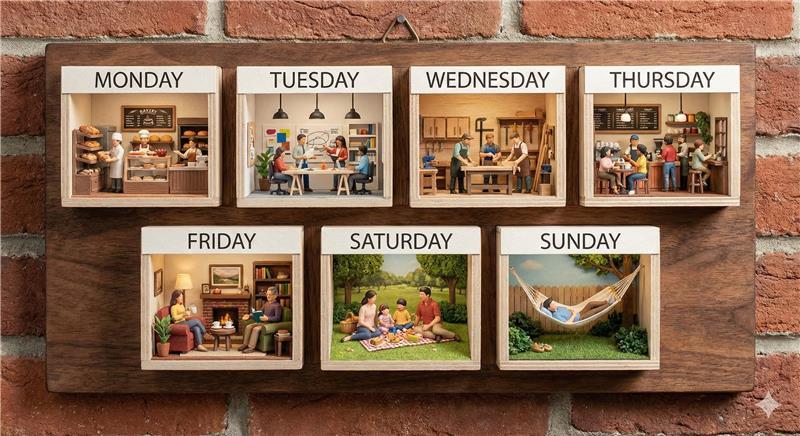How to Know If a Four-Day Workweek Is Right for Your Business
The four-day workweek has become one of the most talked-about workplace shifts of the last decade. Large corporations are experimenting with it....

Not sure if you really need a W‑9 from that vendor you just paid? It’s a common question, and skipping it can lead to IRS penalties or filing headaches down the line. Many small business owners aren’t clear on when to request a W‑9, what to do with it, or why it’s such a critical part of year-end reporting.
In this guide, we’ll cover when a W‑9 is required, how to handle it correctly, and the compliance mistakes small business owners can’t afford to make.
A Form W-9 is required from any U.S. vendor or contractor you pay for services so you can issue the correct Form 1099-NEC or 1099-MISC at year-end. For 2025, the filing threshold remains $600. Beginning with tax year 2026, it increases to $2,000 and will adjust annually for inflation. Even if total payments fall below that amount, collecting W-9s keeps your records accurate and helps prevent compliance issues.
Table of Contents
Before we get into whether you should collect a W-9 from every vendor, let’s clear up one common point of confusion. Though W-9s and 1099s work together, they serve very different purposes, they serve very different purposes. You collect a W‑9 to get the vendor’s tax details, such as their name, address, and Taxpayer Identification Number (TIN). Then, at year-end, you use that information to prepare and file a 1099‑NEC, if it’s required.
In short:
Yes. If you pay someone for services and they’re not your employee, you should have a Form W-9 on file, even if you’re unsure whether those payments will exceed the reporting threshold.
For 2025, businesses must issue a Form 1099 when total payments to a vendor reach $600 or more in a calendar year. Beginning with tax year 2026, that threshold rises to $2,000 under the One Big Beautiful Bill Act (OBBBA) and will adjust annually for inflation. Learn more about tax highlights in the OBBBA.
The rules around filing may change, but good documentation never goes out of style.
Use Form 1099-NEC to report payments for services performed by nonemployees (like contractors, freelancers, or other vendors). Use Form 1099-MISC for other types of payments, such as rent, prizes or awards, legal settlements, or certain medical and healthcare payments.
Collecting a W-9 ensures you have the correct taxpayer information to prepare accurate 1099s at year-end. W-9s are generally required when you’re paying for services, not goods. So, if you’re only purchasing parts or materials with no services provided, a W-9 usually isn’t necessary.
That said, it’s not always clear who qualifies for an exemption. Some vendors may be corporations (and therefore exempt from 1099s), but you won’t know unless you collect a completed W-9. The form shows how the vendor is taxed so you can determine whether their payments need to be reported on a 1099-NEC.
Even if they may be exempt, request a W‑9 from vendors who:
If you’re paying a vendor based outside the U.S., don't request a W‑9. Instead, they’ll need to complete Form W‑8BEN or another W‑8 form, depending on their entity type. These forms help determine whether U.S. withholding tax applies to the payment.
🔎Is that vendor really an employee in disguise? Read our article on employee misclassification.
Request it before the first payment, not at year-end. This ensures you have the vendor’s correct information before issuing a 1099 and prevents missing forms or delays in January. It’s also much easier to get this information before making a payment than after a vendor relationship ends.
You can collect W-9s electronically using tools like QuickBooks, BILL, or payroll portals. These digital options are secure and automatically store forms for future reference.
Making this part of your onboarding process for vendors helps you stay organized and eliminates awkward follow-ups or year-end surprises.
You don’t need to request a new W‑9 annually. However, if the vendor changes their name, tax ID number, or business structure, you’ll need an updated form. Best practice: Request a new W‑9 every few years to keep your records current, even if nothing appears to have changed.
You can download the official IRS Form W‑9 (PDF) directly from the IRS.
Let's say you hire a freelance graphic designer and pay them $2,500 over the course of the year, but you never collected a W‑9.
When January rolls around, you realize you don’t have the tax ID you need to file their 1099-NEC. That simple oversight can lead to:
Even if the mistake was unintentional, the IRS rarely waives these penalties just because you didn’t know better.
🔎For more on this, watch: How 1099s Help Your Small Business Save Money →
Yes, and here’s why: incorrect W‑9 details can lead to rejected 1099s, IRS penalties, and/or backup withholding requirements.
Use the IRS's free TIN Matching Program to confirm that the Taxpayer Identification Number (TIN) and vendor name match. Validating W‑9s before year-end helps you avoid filing errors, mismatched records, and unnecessary penalties.
If they’ve applied for a TIN but haven’t received it, they can write or type Applied For in the TIN field of the W‑9. They must then provide the actual number within 60 days to avoid backup withholding.
W‑9s contain sensitive information like Social Security numbers or Employer Identification Numbers (EINs), so they need to be stored securely.
If you’re working with Kaizen, upload your completed Form W‑9 to your Kaizen Staff Accountant through our secure client portal. As part of our monthly accounting work, we’ll help identify vendors who may require a W‑9, so you’re covered at 1099 time.
Even experienced business owners make small errors that create bigger problems later. These simple oversights can lead to backup withholding, late filings, or hours spent chasing forms at tax time.
Even simple forms like the W-9 can create unnecessary hassle if overlooked. Collecting them early, reviewing them carefully, and keeping them organized will make your year-end filings far smoother.
W-9s might seem simple, but getting them right is essential. Staying consistent with how you collect, verify, and store vendor information helps prevent missing forms and IRS issues.
Want peace of mind knowing your business is compliant and organized year-round?
Schedule a discovery call to learn how Kaizen helps business owners stay on top of reporting requirements, file taxes on time, and keep their financial records accurate and secure.
No. For 2025, you generally do not need to issue Form 1099-NEC or Form 1099-MISC if total payments to a non-employee are under $600 for the calendar year. Beginning in tax year 2026, that threshold increases to $2,000, with inflation adjustments starting in 2027.
However, certain types of payments must still be reported even if they’re below the general threshold. Examples include:
Attorney payments (reported on Form 1099-NEC or 1099-MISC)
Payments subject to backup withholding (typically when a payee fails to provide a valid W-9 or TIN)
Certain federal payments or transactions required by specific reporting rules
For most routine vendor or contractor payments, though, you won’t need to issue a 1099 unless total payments meet or exceed the applicable threshold.
If you pay a vendor without having their W-9 on file, you may be required to withhold 24% of future payments for federal income tax (known as backup withholding). You’ll also risk IRS penalties if you can’t provide correct taxpayer information when filing 1099s.
Stay ahead of tax and compliance changes with practical insights from Kaizen CPAs.
👉 Visit the Kaizen Resource Center to explore guides, videos, and checklists that help you stay organized, compliant, and informed all year long.

The four-day workweek has become one of the most talked-about workplace shifts of the last decade. Large corporations are experimenting with it....

We've all seen the headlines. Another major company announces that everyone needs to be back at their desk. No exceptions. And if you're running a...

If you work with a payroll provider for your small business, payroll typically runs on a set schedule with very little day-to-day involvement from...